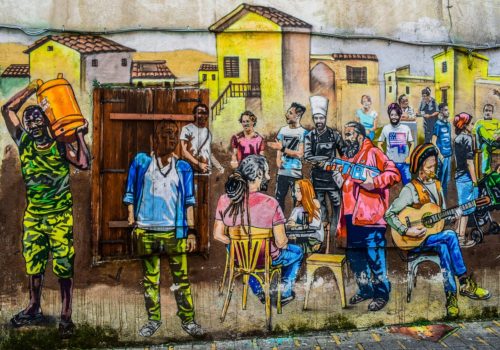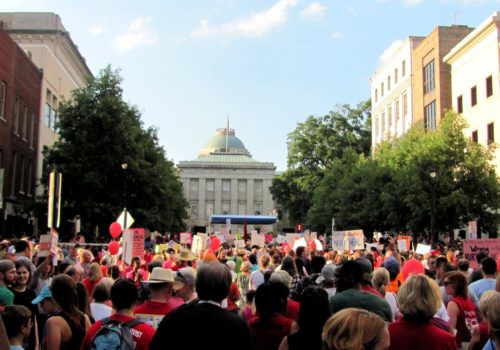Download PDF: Butcher
Growing up in the mountains of Southwest Virginia and East Tennessee, I learned two enduring lessons. First, God is mighty and majestic. Surrounded by mountains too big, too old, and too complex for humans to have crafted, God’s sovereignty became an undeniable foundation of my life and faith. Second, I realized that however much they opened my imagination to the vastness of God, those same mountains also had the power to hem in and close off the towns and people of this region from the outside world. As a result, a great yearning for the “out there” was instilled in me. From within the circling arms of my mountains, I held a hand out, seeking to encounter the people, places, and cultures beyond our craggy world.
Since August 2009, I have been working as a resident chaplain at the Wesley Woods Geriatric Center in Atlanta, Georgia. This is a new culture, a new place, a new “out there” for me. Each day I encounter individuals different than me-different in age, ability, and life experience: I move walkers; I visit the sick; I hear stories about WWII; I sing hymns with people with Parkinson’s and Alzheimer’s disease. Each day, I encounter people from whom I learn.
Wesley Woods Geriatric Center is a campus composed of various facilities including nursing homes, outpatient clinics, independent living apartments, and a hospital. My duties place me in various areas; however, the majority of my time is spent at an independent living facility-Wesley Woods Towers. The Towers is a community of over 150 residents. Some residents are in their early seventies with relatively few health complications, while others are over one hundred and approaching the end of life. The vast majority of residents are experiencing the disabilities associated with aging while remaining actively engaged in their families and communities.
As a chaplain to individuals living in the facility, I minister to people who are suffering to varying degrees. However, regardless of their medical issues, the residents are people who are living with their disabilities and impairments. No matter what state of health they are in, these individuals daily face the emotional, physical, and spiritual challenges associated with healing and grieving, living and aging, longing for something that will be and coming to terms with what is.
Alternately called impairments, restrictions, or limitations, my use of the term disability in this context highlights the myriad issues associated with aging. Disability is an umbrella term that includes various physical, mental, and chronic illnesses. However, the concept of disability is not limited to the experience of one person. Disability also entails the interaction between the person with a disability and the world around her. The individuals I have encountered this year, however elderly or impaired, are still living their lives and encountering their world-a world full of families, friends, faith, ideas, policies, hopes, and questions. For these reasons, I use the term disability to point us forward to an understanding of pastoral care to the aging that both encompasses the unique needs of the individual as well as the broader issues of what it means to be disabled in this world. The residents of Wesley Woods Towers have much to contribute to this study of disability and theology.
One thing that a spiritual care provider quickly learns from this population is that the later years of life are inevitably linked to loss and grief. Many experience grief associated with functional loss, or the loss of some of the muscular or neurological functions of the body, which might include difficulties with walking due to previous surgeries, osteoporosis, Parkinson’s disease, and more.1 Also, many residents deal with a form of eyesight loss known as macular degeneration. This is a debilitating process that results in limited activity and dependence upon others, and it leaves one vulnerable to falls and/or serious complications. While society may see these disabilities as inevitable outcomes of aging, the loss associated with such changes is significant. The role of the spiritual leader and the community is to honor the individual’s grief. As pastoral counselors Anderson and Mitchell explain, “going blind at seventy-five is no less painful than going blind at fifteen.”2
There are many ways to provide spiritual care appropriate to this population. One of the programs at the Towers is a devotional service for the second floor. The second floor is the personal care floor where individuals receive help with medications, meals, and other daily duties. Since this population group is not able to easily mobilize for the regular devotional service, the goal of this program is to bring the service to them. In the social model theory of disability, the focus is on a society that is unaccommodating, rather than on an individual who has difficulties in navigating the environment. The second floor service meets the pastoral care needs of these aging individuals. It is a devotional in which the environment adapts to alleviate the impact of their disabilities.
Every Tuesday at 2:30 on the second floor of the Towers a group of between seven to twelve individuals gathers together for worship. I arrive early to arrange the familiar chairs in a new formation and knock on peoples’ doors. They sit in a small circle, away from the drafty AC, and I perch in the front in their line of sight so no one has to tilt their heads. We sing the hymns at full volume; I use large print bulletins and song sheets. In addition to these situational changes, I have instituted care changes in order to honor and welcome expressions of the losses of aging. Just the other day Mrs. J. shared a request for prayer, as her hearing was getting worse and her eyesight deteriorating. Hers was neither a complaint about her ailment nor an inquiry into possible medical treatments. It was an honest and heartfelt expression of the grief of functional loss. We prayed together for Mrs. J. and others, and in doing so her grief was encouraged, acknowledged, and held in our worshipping community. A care response of acceptance-both functional and theological-is essential to fully honor the grief of the losses of aging.
From within the community, a spiritual care provider also learns from the aging population how best to respond to disability and loss. While many able-bodied groups “fake” a sense of togetherness, this is not the status quo at many communities gathered due to disability.3 The reality of disability breaks down the barriers of pretense and encourages a new and real sense of community. The Wesley Woods Towers community functions well in this more vulnerable and authentic way.
One of the first comments I heard about the Towers community was about the blessing of continued service to others within the community, especially when one was limited by impairments to providing such care. In other words, a man suffering from Parkinson’s disease who can barely walk or talk is able to pull out a chair for his neighbor with macular degeneration who cannot see where the table is. Similarly, a woman recently widowed sits down to eat with her neighbor who lost her husband to the same disease five years earlier. Through their losses and their grief, this community finds a way to serve and be served. Henri Nouwen, who spent time in a community for the developmentally disabled, explores this idea: “We are not alone; beyond the differences that separate us, we share one common humanity . . .. The mystery of life is that we discover this human togetherness not when we are powerful and strong, but when we are vulnerable and weak.”4
The spiritual care provider role in this setting is to empower the community in its vulnerable wholeness. As the modern world presses for independence, strength, and success, the aging population offers an alternative idea of community. As an ordained minister in the Presbyterian Church (USA), I lead worship weekly for the Christian population of the Towers at a regular devotional service. In preaching from the fourth chapter of 2 Corinthians, I used Paul’s words that “we have this treasure in clay jars” to highlight our human imperfections and God’s saving grace. In response, people shared stories of hospital trips, restrictions of movement, and diagnostic tests; these shared weaknesses provided a point of wholeness for the community.
Finally, any spiritual care provider to the elderly necessarily encounters difficult ethical questions. The questions surrounding end-of-life care are legion and incredibly complex. Theology of advance care is also complex. Even within the Christian faith, groups are at odds as to the best ways to proceed. While those from a Catholic tradition typically encourage only non-heroic measures, many mainline and evangelical Protestants often advocate for all possible means of keeping the individual alive. Having stood at the bedside of a patient whose ventilator was being removed, I have witnessed the peace that a family member experiences when her wishes are made known. As a chaplain working in nursing homes, visiting people unable to respond, I know just how difficult “life” can be when it is extended medically. And yet I am also haunted by one doctor’s suggestion that the move towards “pulling the plug” is a desire to distance oneself from the complicated reality of the disability of the dying.
In an address entitled “Merging Two Worlds,” Parker Palmer explores the fundamental assumptions problematizing encounters between the “abled” and the “disabled.”5 Where the “abled” individual has a sense of health and physical vitality, the encounter with a person with disabilities reveals the reality of human frailty. Where one has the desire to “fix” problematic realities, the encounter presents a situation not easily “fixed.” Where one has learned the lesson that love is an achievable and earned goal, the encounter of a person with a profound disability that necessarily exists outside of this productive system, reveals the reality of unconditional love. A spiritual care provider can prepare individuals for these encounters by understanding disability through the lens of theology.
Theologies of disability provide a meaningful contribution by expanding the concept of beings created in the image of God. The Judeo-Christian idea of imago dei is rooted in the scriptural tradition. The notion is primarily derived from Genesis 1:26-31 where, on the sixth day of creation, God crafts man and woman in the likeness of God. There are a number of ways the image of God is developed. Early church leaders like Augustine pointed to the rational will as that which makes us in God’s image. Much later, protestant theologian Karl Barth explained the image of God as the human capacity for relationship.
The study of disability reveals the weaknesses of theology that focuses exclusively on rationality and relationality as evidence of God’s image. For people with severe developmental disabilities, rational will is impossible. For those individuals out-living all of their kin, relationship is also at times illusory. For individuals with chronic mental health illnesses, suffering may be so persistent as to circumvent will and relationship. Where then is God’s image in humanity? Where then, do we say, is God?
Several theologies of disability emphasize that all human beings are created in the image of God; therefore, each and every life offers this reflection. With this fundamental doctrine in mind, a theology of disability stresses that a person with a disability is not an abnormal individual or an outcome of original sin. A person with a disability is “like everyone else, made in the image of God . . . and fully human.”6 Thomas Reynolds states that simply “to BE is to be received as good.7” While this may at first seem to be a passive approach with little role for the rational will or even community relation building, it describes the difficult process of sanctification. Stanley Hauerwas says, “The whole task of Christian discipleship is to receive the gift of life without regret.”8 This does not mean that one must receive all of life’s circumstances without emotion, complaint, or hope for something better. In fact, Hauerwas’s concept of Christian discipleship implies change and effort, be it in receiving one’s own life and the twists and turns that have unfolded or in receiving the gift of the difficult lives of others.
It is important to recognize that many individuals living with disabilities are suffering. If one sees God’s “blessing” as only related to health or wholeness, success or faithfulness, then the frailty of the human condition made clear in the population of the aging and disabled could not be described as a blessing. Indeed, life with disability is difficult. I hear at the Towers, “getting old ain’t for sissies.” One’s encounter with death is increased; one’s difficulties in proceeding through life are increased; one’s previous practices are circumvented, and new lifestyles must be learned. None of these things are easy, or welcomed, or necessarily “blessed.”
I am able to speak from personal experience; I have an auto-immune condition called Celiac disease. While my diagnosis requires relatively few changes, mostly related to diet, they are nonetheless challenging. At home and with friends, I am able to prepare safe and delicious meals that keep me healthy and disarm the disease. However, when I go out to eat or shop at an unfamiliar store, I encounter limits. On the positive side, a celiac diet is often healthier than a “normal” diet. Devoid of processed foods and many fast foods, I get more greens and different grains and I have become a much better cook. However, if someone had given me a choice whether or not to go through my life with this disease I would have said-and still would say-“Please, no.” Living with a disability is a daily burden, a persistent reminder of one’s frailty, and an impediment to developing some societal relationships. It is expensive, a trouble for family and friends, and can cause barriers to full participation in many church and society events. Living with a disability, then, is not a “blessing.”
However, the complex, difficult, beautiful, dynamic gift of life and of life experience is a blessing. It is a gift to be received, and it is our work to receive it. My experiences this year in providing pastoral care to the aging, reading theologies of disability, and identifying my own struggles with a chronic illness, have helped me to see this truth clearly. The Wesley Woods Center is a new culture for me-different in age, ability, and life experience than what I have known before. This year I have stepped out again from my mountains to encounter new people and places. And again, I have welcomed and rejoiced in this joining experience-to see God again, in sovereign surroundings, welcoming our responsive praise.
Photo: “Old Couple in Love.” Photo by Ian Mackenzie. CC BY 2.0.
Notes:
- Kenneth R. Mitchell and Herbert Anderson, All Our Losses, All Our Griefs: Resources for Pastoral Care(Louisville, KY: Westminster John Knox Press, 1983), 41.
- Ibid.
- M. Scott Peck, The Different Drum: Community Making and Peace(New York: Touchstone, 1987), 87. “The first response of a group in seeking to form a community is most often to try to fake it.”
- Brian A. Smith, Closing Comments: ALS-A Spiritual Journey into the Heart of a Fatal Affliction(Toronto, ON: Clements, 2000), 80.
- Parker Palmer, “Merging Two Worlds” (keynote address at a conference by the same title, Rochester, New York, 1986).
- Katherine Black, “A Perspective of the Disabled: Transforming Images of God, Interdependence, and Healing,” in Preaching Justice: Ethnic and Cultural Perspectives, ed. C. M. Smith (Cleveland, OH: United Church Press, 1998), 6.
- Thomas E. Reynold, Vulnerable Communion: A Theology of Disability and Hospitality(Wheaton, IL: Brazos Publishing, 2008), 140.
- Stanley Hauerwas, “The politics of gentleness: abled and disabled,” Christian Century, December 2, 2008, 32.





